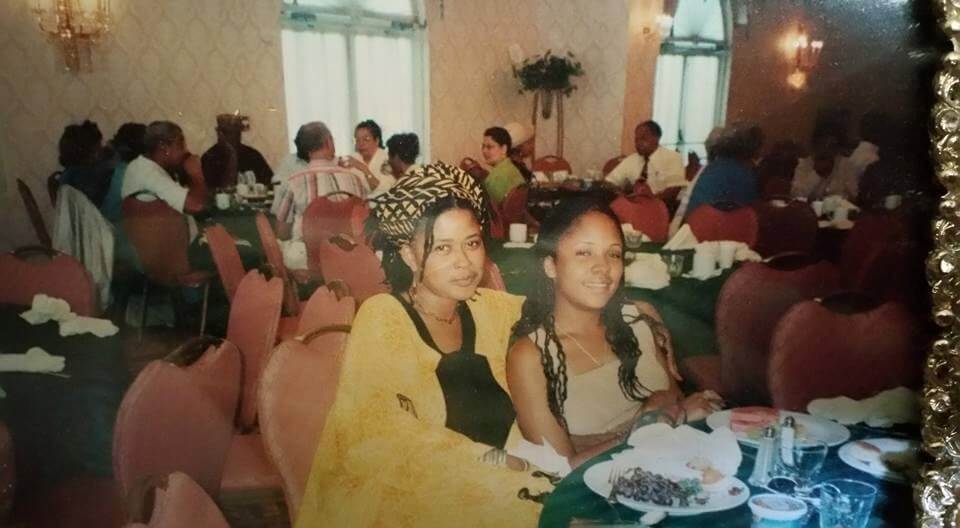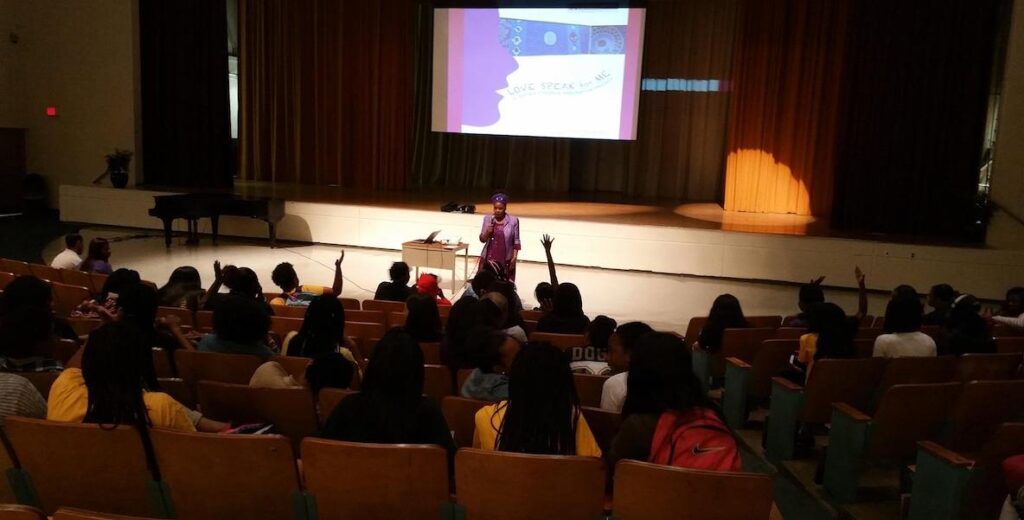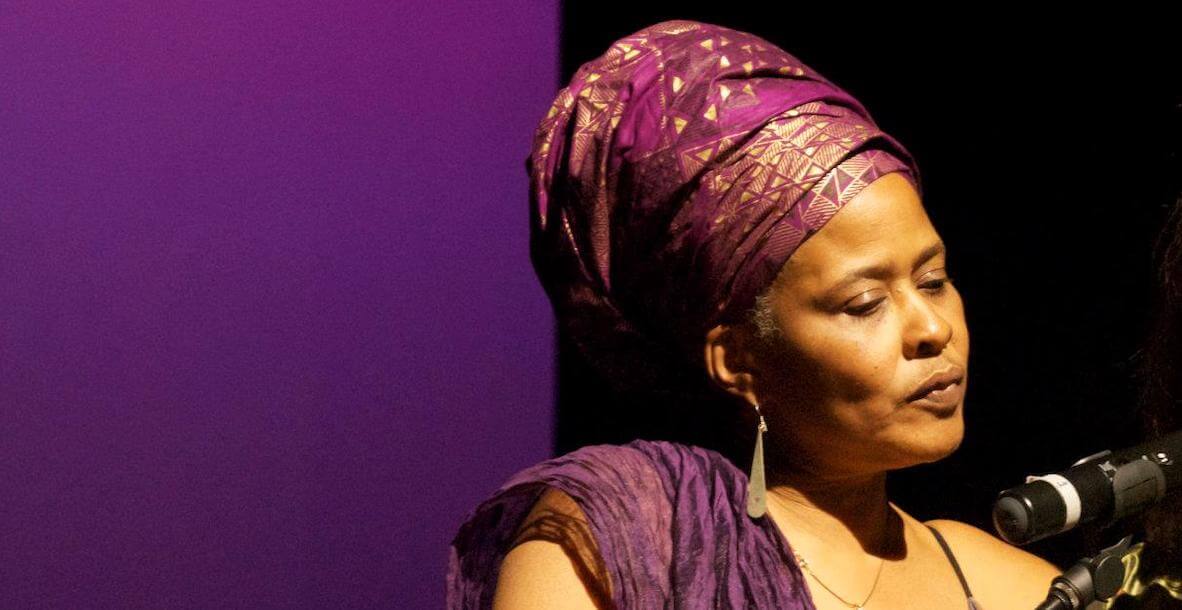Shelah Harper, founder and CEO of the nonprofit Asia Adams Save Our Children Foundation, apologized for every occurrence of foul language as she read aloud the lyrics to hip-hop artist Big Sean’s 2011 chart-topping single “Dance (A$$).”
And if she look good she pay me in sex
Bounce that a—it’s the roundest
You the best, you deserve a crown -itch, right on that ass
The hit featuring Nicki Minaj crests with sexuality at the chorus, so much so that Harper—a woman who grew up in a home where the word “funky” was verboten—can’t make it past the first verse.
“I’d like to leave [the children] with a legacy of hope,” Harper says. “I feel like… if I can make a difference with 10 people, which I know I have, then it’s like my life and Asia’s life wasn’t in vain.”
While excusing herself for allowing the last word to slip through her tongue, Harper explained to me the purpose of the exercise she was demonstrating: to open up conversations with Philly youth about dating violence. She and her team at the Foundation speak to young men and women at area schools throughout Philadelphia, using popular music to connect with students. Group leaders generate conversation with a simple set of questions, asking those in attendance if songs like “Dance (A$$)” make them feel powerful, beautiful, smart or loved, for example.
The answer, more often than not, is no.
“[We’re] changing the ways they discuss women and beauty,” Harper says. “Psychologically, when you’re hearing all of that [music] all the time, everyday—can you imagine what that kind of stuff does to one’s psyche?”
“No, young lady, you’re not an -itch,” she continued. “And that’s what you have a lot of young women thinking.”
“They can’t do anything about what they see”
In a city where murders and overdoses often dominate the news cycle, Harper’s foundation is one of the few focused on educating and preventing intimate partner violence among youth. Teen dating violence is one of the most prominent issues facing school-aged children across the country, with the highest incidents reported among young people in Black communities. As widespread an issue as such things now are, most acts go unreported as teens, and young adults fear reprisals for engaging in risky or unapproved behavior.
Centers for Disease Control and Prevention statistics show intimate dating violence among young people is prevalent, affecting one in 11 women and one in 14 men over the past year. And in her on-the-ground work, Harper sees the true impact of those stats—the children she speaks with are in despair, having either witnessed or experienced some form of intimate partner violence.
“[Children] feel kind of hopeless because one, they see things and they feel like they can’t do anything about what they see,” she says.
“[We’re] changing the ways they discuss women and beauty,” Harper says. “Psychologically, when you’re hearing all of that [music] all the time, everyday—can you imagine what that kind of stuff does to one’s psyche?”
Harper works with a single-minded, intense ferocity to protect Philadelphia’s children, instilling confidence and self-worth while helping them create and navigate their reality. Since she started the foundation almost 20 years ago, she says she has spoken to around 20,000 young people—from middle school to college—about teen dating violence. Frequenting Philadelphia-area schools such as Germantown High, Martin Luther King, and others, she has frank, open conversations, broken down into about 40-minute time slots.
Her interventions are part of a personal journey, meant to keep alive the memory and legacy of her only daughter, Asia, the foundation’s namesake. Seventeen years after her death, almost to the day, she spoke in somber tones, recalling the harrowing details leading up to and surrounding the senseless killing of the 21-year-old West Chester University student. And Harper never once said the names of the men who murdered her daughter—both of whom received life sentences without the possibility of parole—as if doing so would give them power that they don’t deserve.
The foundation was, almost immediately, a way to cope with the loss and celebrate Asia Adams’s life. “Right when everything happened, it took them 10 days to locate the person who, you know, that did this and I couldn’t sleep for 10 days,” Harper says. “I couldn’t sleep. And so I ended up having—I grabbed a book. I always keep one of these books, I always have them everywhere. I have one from every year, from 1980-, no, 70-something. And I started writing. “I immediately started planning [the foundation].”
“That was my only child and I felt it”

Media outlets, true crime fanatics, and others with a public forum covered the details of Asia Adams’ murder by her then-boyfriend and accomplice ad nauseam when it happened—and for years after—giving voice to the men who took her away. Harper wants her work to celebrate who Adams was: a 21-year-old visionary, powerful, emotionally intelligent Black woman with strong ties to her family and community.
According to Harper, Adams had a unique way of bringing people together—she was a standout student at Penn Charter who would rally classmates of diverse backgrounds behind any and every cause. The mother and daughter duo were closer than most, with Harper recalling Adams was a free spirit with a weird sense of humor who would make up strange and silly songs for fun. Harper’s only wish was that her daughter be a better mold than her.
Determination and endurance are two traits Harper learned at a young age, both of which she tried to pass on to her daughter. “Philadelphia is kind of a crazy city, but I felt as though I had raised Asia to be careful,” Harper said. “If you spoke like you went to Penn Charter, people would turn around and look at you like, oh, and you would be noticeable. So you had to kind of code switch when you were in the hood. You had to speak in a different way.”
When Shelah Harper gave birth to Asia Adams, she felt her daughter’s life separate from hers when the doctors cut the umbilical cord. Something similar happened to her when Adams passed on November 07, 2004.
“I was watching the leaves,” Harper said. “It was this beautiful oak tree. And this wind went through the oak tree and the leaves kind of turned up. And it was that click that I felt as though she was gone. It was the strangest thing. And she actually was and they confirmed it a month later.”
“But I knew. I felt it,” she continued. “Because that was my daughter, that was my only child and I felt it.”
“That’s a population that we’ve got to try to reach”
Yvonne Farrell, board chair of the Asia Adams Foundation and former employee of the City of Philadelphia, reiterated her point in a loud, booming voice that no, guys do not have to hit women to show them that they like them.
A close friend of Harper’s and member of the foundation since its inception, Farrell noted that such actions would be brushed off, or worse, accepted when she was younger. Playful shoving, verbal abuse, and other things society tells young women to take as normal are, in almost all cases, preludes to something much worse.
In the early days after Asia Adams’ death, Yvonne Farrell played a crucial supportive role, both in helping Shelah Harper through her grief and with the fledgling foundation. Both women sat on Farrell’s living room floor, developed the organization’s mission, and sought out grants and seed money.
“When you think about young people and intimate dating violence—as young as twelve and ten years old—you realize that’s a population that we’ve got to try to reach,” says Farrell.
Harper used her background in psychology—she’s a graduate of Lincoln University who held various positions during her time as an independent contractor—and immediately began developing a curriculum for the program.
One of her earliest ventures was a partnership with the Police Athletic League, where she hosted a girls’ youth development program. Over the years, the Asia Adams Foundation has held events both large and small, from a Sadie Hawkins Day to a Family Fun Day and more, bringing together young people from across the city for its youth advisory board. Determined to keep the foundation running, Harper didn’t—and to this day hasn’t—taken money for her role as the executive director.

Harper’s organization has also contributed to the larger conversation on teen dating violence, including reports for the Pennsylvania State Health Department, the University of Pennsylvania School of Nursing, and more. And policy work is now a significant part of the group’s curriculum, Harper said, as she not only helps schools and their students develop dating and violence policies but teaches students to involve themselves in larger political questions.
And according to Farrell, the Asia Adams Foundation has actually helped change the conversation on teen dating violence. “I’m not going to say that no one else was talking about [teen dating violence], but I know no one else was talking about it in Philadelphia,” Farrell said. “They would always talk about domestic violence. But when you think about domestic violence, you always think about older people, women.”
“When you think about young people and intimate dating violence—as young as 12 and 10 years old—you realize that’s a population that we’ve got to try to reach,” she continued.
“Do you meet the requirements to be my boyfriend?”
The CDC reports that over 25 percent of women and 15 percent of men who experience any form of dating violence—sexual, physical or stalking—do so before the age of 18. And according to the Youth Risk Behavior Survey, young Black men and women are more likely to be physically assaulted, defined as hit, slapped or otherwise hurt, by their intimate partners. Sexual minority groups, including LGBTQIA teens, also face disproportionate risks of violence.
Parental disapproval and fear of adults can keep young people from speaking up. “I’m going to tell you that everybody thinks that their little girls aren’t doing —,” Harper said. “They are, just like everybody did it at some point.”
And after almost every session, Shelah Harper has a student come up to her and confide. “They don’t raise their hand and speak it out loud to the entire group, but afterward, yes,” Harper said. “I would say that over 50 percent either know of someone in this situation or their parent is in this situation.”
“Young women tell me about their own personal situation,” she continued. “In that case, I will refer them to the National Teen Dating Violence folks and whatever other resources that they might need.”
As she spoke, Harper opened her curriculum folder on her computer and brought out several posters she uses to engage her students—images of hip-hop artists, rap lyrics and different questionnaires meant to stimulate conversation. “For example, this is another [poster] that was done,” Harper said. “‘Do you meet the requirements to be my boyfriend?’ They have a job interview.”
Alexis Lopes, Asia Adams’ high school best friend and the vice chair of the Asia Adams Foundation’s board, is a firm believer in Shelah Harper’s cause. She sees teen dating violence as an intricate issue that affects how young men and women perceive themselves and their self-confidence. As a registered nurse and mother of two teenagers and a 6-year-old, she’s thankful that Harper’s organization gives families like hers an outlet to discuss such complex topics.
“I think it’s a really important thing to educate young women and men about what [abuse] looks like,” Lopes said. “In the city, you’re watching—possibly as a child—you’re watching your parents, maybe, or someone older in a toxic relationship, and you might think it’s okay. So it’s so important to educate people, especially the children, that this is not okay.”
Lopes does her best to impart these principles upon all her children, including her daughter, Asia, whom she named after her best friend. She gives her time to the Asia Adams Foundation because the foundation provides so much to her. “I think [the foundation] has been extremely important for [Asia’s] legacy and to help others and help Ms. Shelah and to help all of us,” Lopes said. “It kind of puts a new perspective on a terrible tragedy.”
“For me, Ms. Shelah is inspiring,” she continued.
Who wouldn’t be inspired by this persevering woman who has turned tragedy into opportunity for positive change? “I’d like to leave [the children] with a legacy of hope,” she says. “I feel like, even though we’ve seen 20,000 children all over the place, if I can make a difference with 10 people, which I know I have, then it’s like my life and Asia’s life wasn’t in vain.”
“I don’t know if that makes sense, but that’s from my heart.”
If you or a young person you know is experiencing intimate violence, call the National Teen Dating Abuse Hotline: 800-799-7233
![]()
RELATED
How to Get Low-Cost (and Free) Mental Health Services in Philadelphia
Ideas We Should Steal: Fighting Domestic Abuse During Covid-19




